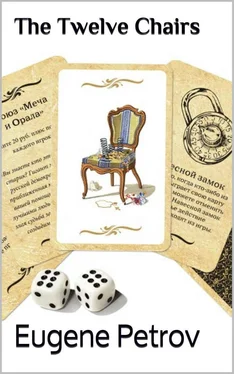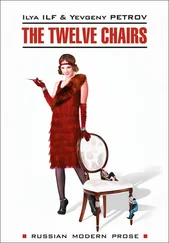Eugene Petrov - The Twelve Chairs
Здесь есть возможность читать онлайн «Eugene Petrov - The Twelve Chairs» весь текст электронной книги совершенно бесплатно (целиком полную версию без сокращений). В некоторых случаях можно слушать аудио, скачать через торрент в формате fb2 и присутствует краткое содержание. Год выпуска: 2013, Жанр: Юмористическая проза, на английском языке. Описание произведения, (предисловие) а так же отзывы посетителей доступны на портале библиотеки ЛибКат.
- Название:The Twelve Chairs
- Автор:
- Жанр:
- Год:2013
- ISBN:нет данных
- Рейтинг книги:5 / 5. Голосов: 1
-
Избранное:Добавить в избранное
- Отзывы:
-
Ваша оценка:
- 100
- 1
- 2
- 3
- 4
- 5
The Twelve Chairs: краткое содержание, описание и аннотация
Предлагаем к чтению аннотацию, описание, краткое содержание или предисловие (зависит от того, что написал сам автор книги «The Twelve Chairs»). Если вы не нашли необходимую информацию о книге — напишите в комментариях, мы постараемся отыскать её.
Find traces of a separate headset difficult and heroes face different adventures and troubles.
The Twelve Chairs — читать онлайн бесплатно полную книгу (весь текст) целиком
Ниже представлен текст книги, разбитый по страницам. Система сохранения места последней прочитанной страницы, позволяет с удобством читать онлайн бесплатно книгу «The Twelve Chairs», без необходимости каждый раз заново искать на чём Вы остановились. Поставьте закладку, и сможете в любой момент перейти на страницу, на которой закончили чтение.
Интервал:
Закладка:
the corner on the floor, continued eating in the hope that fate would spare
them, but the loud-speaker cheerfully went on: •
"Evecrashshsh . . . viduso . . . valuable invention. Railwayman of the
Murmansk Railway, Comrade Sokutsky, S Samara, O Oriel, K Kaliningrad, U
Urals, Ts Tsaritsina, K Kaliningrad, Y York. So-kuts-ky."
The trumpet wheezed and renewed the broadcast in a thick voice.
". . . vented a system of signal lights for snow ploughs. The invention
has been approved by Dorizul. . . ."
The old women floated away to their rooms like grey ducklings. The
loud-speaker, jigging up and down by its own power, blared away into the
empty room:
"And we will now play some Novgorod folk music."
Far, far away, in the centre of the earth, someone strummed a balalaika
and a black-earth Battistini broke into song:
"On the wall the bugs were sitting,
Blinking at the sky;
Then they saw the tax inspector
And crawled away to die."
In the centre of the earth the verses brought forth a storm of
activity. A horrible gurgling was heard from the loud-speaker. It was
something between thunderous applause and the eruption of an underground
volcano.
Meanwhile the disheartened fire inspector had descended an attic ladder
backwards and was now back in the kitchen, where he saw five citizens
digging into a barrel of sauerkraut and bolting it down. They ate in
silence. Pasha Emilevich alone waggled his head in the style of an epicurean
and, wiping some strings of cabbage from his moustache, observed:
"It's a sin to eat cabbage like this without vodka."
"Is this a new intake of women?" asked Ostap.
"They're orphans," replied Alchen, shouldering the inspector out of the
kitchen and surreptitiously shaking his fist at the orphans.
"Children of the Volga Region?"
Alchen was confused.
"A trying heritage from the Tsarist regime?"
Alchen spread his arms as much as to say: "There's nothing you can do
with a heritage like that."
"Co-education by the composite method?"
Without further hesitation the bashful Alchen invited the fire
inspector to take pot luck and lunch with him.
Pot luck that day happened to be a bottle of Zubrovka vodka,
home-pickled mushrooms, minced herring, Ukrainian beet soup containing
first-grade meat, chicken and rice, and stewed apples.
"Sashchen," said Alexander Yakovlevich, "I want you to meet a comrade
from the province fire-precaution administration."
Ostap made his hostess a theatrical bow and paid her such an
interminable and ambiguous compliment that he could hardly get to the end of
it. Sashchen, a buxom woman, whose good looks were somewhat marred by
sideburns of the kind that Tsar Nicholas used to have, laughed softly and
took a drink with the two men.
"Here's to your communal services," exclaimed Ostap.
The lunch went off gaily, and it was not until they reached the stewed
fruit that Ostap remembered the point of his visit.
"Why is it," he asked, "that the furnishings are so skimpy in your
establishment?"
"What do you mean?" said Alchen. "What about the harmonium?"
"Yes, I know, vox humana. But you have absolutely nothing at all of any
taste to sit on. Only garden benches."
"There's a chair in the recreation room," said Alchen in an offended
tone. "An English chair. They say it was left over from the original
furniture."
"By the way, I didn't see your recreation room. How is it from the
point of view of fire hazard? It won't let you down, I hope. I had better
see it."
"Certainly."
Ostap thanked his hostess for the lunch and left.
No primus was used in the recreation room; there was no portable stove
of any kind; the chimneys were in a good state of repair and were cleaned
regularly, but the chair, to the incredulity of Alchen, was missing. They
ran to look for it. They looked under the beds and under the trunks; for
some reason or other they moved back the harmonium; they questioned the old
women, who kept looking at Pasha Emilevich timidly, but the chair was just
not there. Pasha Emilevich himself showed great enthusiasm in the search.
When all had calmed down, Pasha still kept wandering from room to room,
looking under decanters, shifting iron teaspoons, and muttering:
"Where can it be? I saw it myself this morning. It's ridiculous !"
"It's depressing, girls," said Ostap in an icy voice.
"It's absolutely ridiculous!" repeated Pasha Emilevich impudently.
At this point, however, the Eclair fire extinguisher, which had been
hissing the whole time, took a high F, which only the People's Artist,
Nezhdanova, can do, stopped for a second and then emitted its first stream
of foam, which soaked the ceiling and knocked the cook's cap off. The first
stream of foam was followed by another, mouse-grey in colour, which bowled
over young Isidor Yakovlevich. After that the extinguisher began working
smoothly. Pasha Emilevich, Alchen and all the surviving brothers raced to
the spot.
"Well done," said Ostap. "An idiotic invention!"
As soon as the old women were left alone with Ostap and without the
boss, they at once began complaining:
"He's brought his family into the home. They eat up everything."
"The piglets get milk and we get porridge."
"He's taken everything out of the house."
"Take it easy, girls," said Ostap, retreating. "You need someone from
the labour-inspection department. The Senate hasn't empowered me . . ."
The old women were not listening.
"And that Pasha Melentevich. He went and sold a chair today. I saw him
myself."
"Who did he sell it to? " asked Ostap quickly.
"He sold it. . . that's all. He was going to steal my blanket. . ."
A fierce struggle was going on in the corridor. But mind finally
triumphed over matter and the extinguisher, trampled under Pasha Emilevich's
feet of iron, gave a last dribble and was silent for ever.
The old women were sent to clean the floor. Lowering his head and
waddling slightly, the fire inspector went up to Pasha Emilevich.
"A friend of mine," began Ostap importantly, "also used to sell
government property. He now lives a monastic life in the penitentiary."
"I find your groundless accusations strange," said Pasha, who smelled
strongly of foam.
"Who did you sell the chair to?" asked Ostap in a ringing whisper.
Pasha Emilevich, who had supernatural understanding, realized at this
point he was about to be beaten, if not kicked.
"To a second-hand dealer."
"What's his address?"
"I'd never seen him before."
"Never?"
"No, honestly."
"I ought to bust you in the mouth," said Ostap dreamily, "only
Zarathustra wouldn't allow it. Get to hell out of here!"
Pasha Emilevich grinned fawningly and began walking away.
"Come back, you abortion," cried Ostap haughtily. "What was the dealer
like?"
Pasha Emilevich described him in detail, while Ostap listened
carefully. The interview was concluded by Ostap with the words: "This
clearly has nothing to do with fire precautions."
In the corridor the bashful Alchen went up to Ostap and gave him a gold
piece.
"That comes under Article 114 of the Criminal Code," said Ostap.
"Bribing officials in the course of their duty."
Nevertheless he took the money and, without saying good-bye, went
towards the door. The door, which was fitted with a powerful contraption,
opened with an effort and gave Ostap a one-and-a-half-ton shove in the
Читать дальшеИнтервал:
Закладка:
Похожие книги на «The Twelve Chairs»
Представляем Вашему вниманию похожие книги на «The Twelve Chairs» списком для выбора. Мы отобрали схожую по названию и смыслу литературу в надежде предоставить читателям больше вариантов отыскать новые, интересные, ещё непрочитанные произведения.
Обсуждение, отзывы о книге «The Twelve Chairs» и просто собственные мнения читателей. Оставьте ваши комментарии, напишите, что Вы думаете о произведении, его смысле или главных героях. Укажите что конкретно понравилось, а что нет, и почему Вы так считаете.












